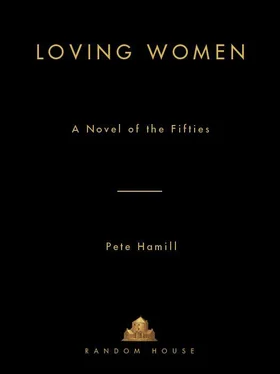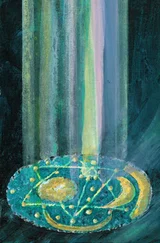I walked about a mile and saw a gas station with a small seafood store attached to the office. I bought a pound of shrimp for a dollar and crossed the highway and sat down on a damp log. I peeled the shrimp and ate quickly and wanted more. Thinking: They know I’m gone now for sure . I imagined Donnie Ray calling Red Cannon and asking if I was locked up somewhere and Red saying, Locked up? Hell, no . He came home with me on Sunday morning.
I was AWOL.
They’d come after me for that.
And maybe worse.
Maybe murder.
I finished the shrimp and looked back at the gas station across the road. The sun was now gone. A blue ’49 Chevy was parked at the pump with an Air Force sticker in the rear window. Two guys were at the Coke machine. Another came around the side of the building where he’d obviously just taken a leak. A tiny man in coveralls was gassing up the car. One of the three young men went into the shrimp place. I walked over.
“Hey, can I hitch a ride with you guys?” I said.
The tallest one squinted at me. He was wearing a starched sleeveless white shirt and chinos. He went around to the driver’s side, and started to get in, without giving me an answer. The other one paid for the gas. The third came out with a large bag of shrimp.
“Where you goin?” the tall one said.
“New Awlins,” I said, trying to pronounce the words the way Roderick did. Not New Or-leeens.
“You got a couple of bucks for gas?” he said.
“Yeah.”
“Get in.”
They were all enlisted men, stationed at Keesler, and were starting a ten-day leave. All were from Texas and they were going home. Dave, the tall one, was from Austin, and he drove as if trying to establish a speed record. Harry, who bought the shrimp, was from Fort Worth. Jake was from Dallas. He was the crew’s paymaster and after I got in beside him in the back seat, I gave him three bucks. As Dave drove with ferocious concentration, passing trucks, dodging oncoming cars, the others pulled the shells off the shrimp and threw them out the open windows into the steaming air and then passed around a bottle of Jack Daniels.
“Have a belt.”
“I better not.”
“It’s Mister Daniels.”
“I got some business in New Awlins. I don’t want to get there plastered.”
“Suit yisself.”
It was hard to see them in the dark. I huddled in the back seat in a corner behind the driver, feigning sleep or staring into the darkness. I was Miller from Miami but I didn’t want them to know me, to catch me in some dumb little lie. The bottle moved around. I thought: Be sharp, be cool. Get drunk and you’ll lose control. You’ll get caught. You’ll see a brig before you see New Orleans. Before you find what you’re looking for. And you can’t tell these guys. They’re not your friends. They’re just Air Force guys going home .
We stopped five times. Someone had to piss. Someone wanted sandwiches. Someone had to puke. Once I came suddenly awake as the car swerved, spun around on the empty road, came to a coughing stop. Dave had almost rammed a wandering cow.
“Open range!” Jake shouted. “Bounty hunter!”
We got out and they all laughed and passed around the bottle and this time I took a slug. The bourbon was hot, burning, good. We all pissed into the dark.
Then a vast swarm of mosquitoes found us, thick, dense, silvery in the moonlight, filling our noses and mouths, and we were slapping our faces and arms and running to the car. Dave pulled away, cursing and slapping, the windows wide open to blow the rest of the mosquitoes out. My arms and neck were bumpy from bites. Harry said we should rub whiskey on the bites and Dave said that was a hell of waste of good bourbon and Jake said, Well, let’s try it a little. I didn’t do it. Where I was going, I didn’t want to smell of bourbon. I didn’t drink anymore after that.
The night air smelled different now: hot, salty. I saw patches of black water, then great open swatches like lakes, with shanties up on stilts over the water. We crossed a steel drawbridge and then we saw a sign. Chef Menteur. Two gas pumps, some fishing shanties and a bar.
“Goddamn, a real metropolis.”
“Named after a chef!”
“You know you in Louisiana now.”
“Wuddint that the Pearl River?”
We all went into the bar. I was hot and thirsty, because of the bourbon. Inside, there were two guys playing a shuffleboard machine and a red-haired woman behind a small bar. She looked up when we came in. She was wearing a lot of makeup and her tits were too pointy to be real.
“You boys old enough to drink?” she said.
“We’re old enough to die in Korea,” Dave said, laying two singles on the bar.
“Then you’re old enough to drink,” she said and smiled and gave her tits a little shake.
There was a crude map on the wall between the two windows, with a sign above it saying: DON’T ASK WHERE YOU ARE. YOU’RE HERE. The arrow pointed at Chef Menteur. We were on a kind of island, and at the western end there were a lot of little streams called the Rigolets and a half dozen places marked SWAMP. Using the map as a guide, I looked out in that direction. In the distance, the sky was glowing. I turned to the barmaid.
“How far are we from New Awlins?” I said.
“You’re in it, boy.”
Whooping, hollering, calling to women and drinking from a fresh bottle, they dropped me off on the corner of Canal and Rampart and then sped away. In all the years since, I’ve spent too much time showing up in strange cities at night. None of them have ever looked to me the way New Orleans did that first time. I stared around me and for a long strange moment felt as if I were home. There were office buildings, all brightly lit, souvenir stores and camera shops and jewelry joints, restaurants and huge hotels and big-assed women with yellow dresses and pairs of cops smoking cigarettes in doorways. Just like New York. And there were trolley cars. That’s what did it to me, reached out, hugged me, promised me the salvation of the familiar. The trolley cars: their steel wheels clacking on steel rails, squealing as they turned from a side street into Canal, the conductors ding-donging their warning bells. They were the older cars, made in part of wood, with square Toonerville Trolley faces, the kind that ran along Fifth Avenue in Brooklyn, not the streamlined gray trolleys that now raced along the Seventh Avenue line. And I thought: I’m a long way from home .
And thought again: I’ll be all right .
So I started to walk. New Awlins . Almost midnight. The heat still rising off the sidewalks. The gutters soft from the blaze of day. I needed a place to stay but I knew the big hotels were beyond me; I just couldn’t spend that kind of money or risk a demand for identification. And I sensed that if Canal Street was like Times Square, then the Shore Patrol would be around here somewhere, picking up strays. I had to get off into the side streets to where ordinary people lived and there’d be a boarding house with no questions asked, a hideout where the Shore Patrol was never seen.
Suddenly I was at the river. There were people on line, waiting for a ferry marked Algiers. A line of cars too. Algiers? Jesus. Wasn’t that in North Africa ? I walked past the waiting lines, out to the edge of the ferry slip and looked down.
The Mississippi.
Black and glossy and moving slowly.
I heard a deep voice behind me.
“Help you, son?”
I turned and saw a cop staring at me. Old guy. Maybe fifty. Fat. Pouchy eyes. His face shiny with the heat.
“Uh, no, no, I’m fine. Why?”
“Oh, just we get a lotta jumpers along here. Dey stand here and den dey go in da water and dat’s all she wrote.” He was closer now, looking into my eyes. “You aint thinkin of doin nuttin foolish , are ya?”
Читать дальше












